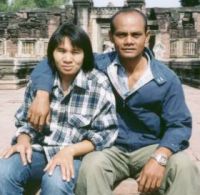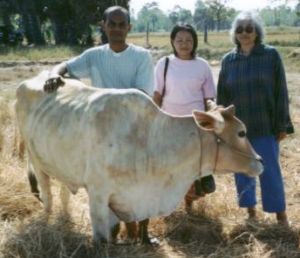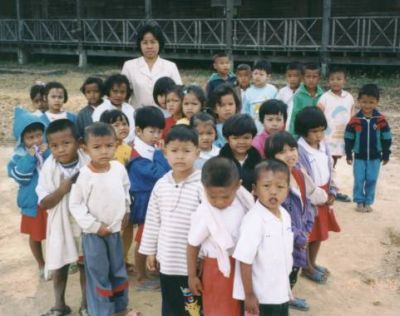Steve and Jemjahn go to Thailand, 2003
5. Jem's Old Home in the Village
10. Impressions of the Village
22. Thai People, My Impressions
9. Jem's family
Parents. All deceased. Mother died about two years ago, step-father about ten years ago, birth father when Jem was five.
Jem says her real father (whose first name, interestingly, was Kone) was the tallest man in the village, and by the age of 25, also the richest. Maybe some hero worship, but who can blame her, as she remembers him with much love. He seemed to succeed at everything he tried: raising animals and crops, buying and selling land, and at 25, to be named principal at the school where he taught.
He was in Chakarat, the big city, eating lunch hours before a meeting with the school administrators, when he collapsed and died.
Jem has always suspected a cousin of her father of poisoning him. He was another teacher who did get the school principal position and went on to a long and prosperous life.
After her husband’s death, Jem’s mother suddenly found herself destitute. Like many rural folk, her husband hadn’t properly recorded his land holdings at the county government. It was both to save on filing fees and a general mistrust of the government, but the result was that his wife had no claim on the land she and her husband owned. Almost all of it was lost, even after going to court to try to demonstrate ownership. Over the years Jem has bought some of the land back, and when she refers to it, it’s always as “my father’s land.”
Jem’s mother, still a young woman, married again, but her second husband had few of the abilities of her first. Trying to get them out of their money pit, he often would gamble what little they had, but of course usually lost even that. Alcohol helped erase the misery, which sometime led to jail time for drunken assaults on neighbors.
Throughout his generally miserable life, his only luck was when his step-daughter, Jemjahn, fled the village for Bangkok because she refused an arranged marriage, where she married a “rich” American. (That would be me.)
Jem says that as bad as he was, he never sexually abused her, never gave her less food than his other children, once saved her life by climbing a tree to kill a “tookeh” (a large poisonous lizard) that had cornered Jem up in the branches. He was just a poor, hardworking rice farmer with more children than he could support, and it drove him crazy.
Sangjahn. Youngest sister, early 30s. Lives with husband Samahn in her mother’s house, where she grew up. Is Jem’s manager for her “projects.” Jem calls her on the phone almost every day.
When I was stationed in Thailand in the late 1960s, it was at a large Army signal site. One of the benefits of the job was that we could use a voice channel during quiet weekend hours to call home. A regular phone call back then was both beyond our paychecks and technically difficult. Satellites were a recent invention, so most of the call traveled on wire, to include expensive undersea cable. Receiving a call from the states was about impossible.
Today
my dear wife can ring her sister’s cell phone for just a few cents a
minute at any time of the day or night. Sometimes her sister is away
from the house, maybe in the city, maybe standing in a rice field, and
her phone will ring: it’s her sister calling from the other side of the
world. It sometimes stops me in astonishment to realize that in one
generation we’ve gone from being virtually unable to call Thailand at
all to being able to talk to a Thai farmer in the middle of his rice fields.
fields.
Sangjahn has a job in a large factory in Korat, but also seems to have plenty to do around the house, what with dozens of geese and ducks, a large vegetable garden, selling fish from her pond, and maybe most of all, keeping up with Jem’s never-ending projects. She appears content with her life. She has a good husband, a healthy child, lives in a good house, has no fear of starvation.
Samahn. Sangjahn’s husband. Village
boy, Jem was friends with his parents when they were all children. Earns
a living picking up jobs as they come: chauffer, barber, and lately,
tending the family cows. The latter were bought a couple years ago in
one of Jem's pro jects.
They’ve bred until the herd has now doubled in size, to about a dozen
healthy animals.
jects.
They’ve bred until the herd has now doubled in size, to about a dozen
healthy animals.
I came to like Samahn during our trip there. Though Jem told me it was said in the village that “he can’t work in the rice fields,” a disparaging account of his character, I found him to be an able carpenter, plumber and brick layer, an excellent driver (it surprised me to realize the van had a manual transmission), and he gave me the best haircut, if the most careful, of my life. (I insisted on paying him for it, and gave him the standard fare plus the standard tip.) He’s worked in Taiwan - a chance for some high wages, if the contractor, whether Thai or host-nation, doesn’t cheat you, but they did him - and seems capable of doing more than he now is.
K. Samahn and Sangjahn’s only
child. About five years old, cute little girl, but
 so
shy with us. I’m not particularly warm with children, but Jem makes up
for me, and even she couldn’t break through with K. Neither of us
ever sat down with the child, bounced her on our laps, played games with
her. The whole two weeks she spent most of her waking hours at school or
her friend’s house. The photo at right is telling. At the schoolyard, all
the classes having lined up before opening bell, I asked K's teacher
If I could
take a class photo. Almost all the children positioned their faces to be
clearly seen by the camera. All we can see of K (standing in
front of her teacher) is half her face as she peers from behind a
friend. Not sure what's in the child’s mind. But look at the little boy
at the right, in blue pants, standing at attention. He captured Jem's heart.
so
shy with us. I’m not particularly warm with children, but Jem makes up
for me, and even she couldn’t break through with K. Neither of us
ever sat down with the child, bounced her on our laps, played games with
her. The whole two weeks she spent most of her waking hours at school or
her friend’s house. The photo at right is telling. At the schoolyard, all
the classes having lined up before opening bell, I asked K's teacher
If I could
take a class photo. Almost all the children positioned their faces to be
clearly seen by the camera. All we can see of K (standing in
front of her teacher) is half her face as she peers from behind a
friend. Not sure what's in the child’s mind. But look at the little boy
at the right, in blue pants, standing at attention. He captured Jem's heart.
Jang. Third oldest sister, about 45. Married to Sompahn, a great guy, have two teenage sons. Lives in Korat. Used to work in a department store, then couldn’t stand on her feet all day, now picks up some extra money selling food at the house or at country fairs. Often made our meals during our stay, and for a while there was in contention for Jem’s crown of World’s Greatest Cook.